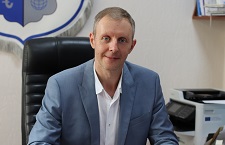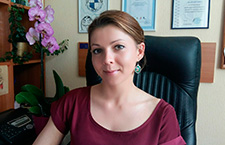About Ukraine
Location: Eastern Europe; Ukraine is a part of former Soviet Union or USSR, one of the NIS states ("Newly Independent States"), and member of CIS ("Commonwealth of Independent States", a subdivision of the NIS).
Neighbours: Poland, Slovakia, Hungary, Romania, Moldova, Russia, and Belarus
Population: approximately 46 million (down from peak of 51 million in 1980s)
Area: 603,000 km2 (slightly larger than France and slightly smaller than Texas)
Capital: Kyiv (or Kiev). Kyiv is derived from Ukrainian and Kiev from Russian (Kyiv is considered the birthplace of Russian and East Slavic culture and statehood). While Kyiv is now considered politically correct, Kiev appears in Google seven times more frequently.
Languages: Ukrainian and Russian.
Ukrainian is Ukraine's the only official government language. In everyday use the languages are about equally popular through Ukraine, though proportion of usage differs widely by region. However, the vast majority of the population is functionally bilingual.

Climate: temperate continental, except for a small strip of Crimea's southern coast, which has a mediterranean climate.
Major religions:
- Ukrainian Orthodoxy, Kyiv Patriarchate;
- Ukrainian Orthodoxy, Moscow Patriarchate;
- Ukrainian Autocephalous Orthodoxy;
- Ukrainian Catholicism (Uniate);
- Protestantism;
- Jewish Orthodoxy;
- Greek Catholicism
Economy: Principal exports are metals, minerals, electronics, chemicals, and vegetables.
Government structure: Republic.
Powerful executive branch with five-year presidential term and Cabinet of Ministers with a Prime Minister appointed by the President. Legislative branch consists of unicameral 450-seat Verkhovna Rada (Supreme Council). People's deputies serve four-year terms. Judicial branch: Supreme Court, Constitutional Court. Ukraine government structure is still in a developmental stage. During President Kuchma's terms (1994-2004) the executive branch became the only real centre of power, but this is likely to be changed in 2005-2006 by a series of administrative and constitutional reforms. Ukraine consists of 27 administrative regions: 24 regions, the Crimea Autonomous Republic, and two cities with a heroic status as Kyiv and Sevastopol.

National holidays:
- January 1 – New Year's Day
- January 7 – Christmas (Orthodox calendar)
- March 8 – International Women's Day
- May 1 and 2 – International Workers' Solidarity Day
- May 8 – Day of Remembrance and Reconciliation
- May 9 – Victory Day
- June 28 – Constitution Day
- August 24 – Independence Day
- October 14 – Ukraine Defender's Day
Did you know that?
Ukraine stands 4th among the most educated nations in the world
According to the 2007 national census the number of people with higher education has grown by 34.9% in the last 12 years.
High-level research is also a strong-point in Ukraine. The country current has 1350 scientific organizations employing 450,000 people, 295,000 of whom are directly involved in research and development: that's 40% more than in the UK.
Ukrainian science can trace its roots back to the 10th to 12th centuries. The names of the scholars of the Kyivan Rus were well-known to medieval Europe. Among them, for instance, was philologist Meletiy Smotrytskyi whose Slovenian Grammar laid down the foundations for the spelling of a great many Slavic languages. In the 18th century the Kyiv-Mohyla Academy was a major centre of science and scholarship.

The 20th century was most fruitful for the development of Ukrainian research scholarships and brought with it world recognition: in geochemistry and natural history (V. Vernadskyi), microbiology (I. Mechnykov, D. Zabolotnyi), biology (O. Bohomolets), chemistry (L. Pysarzhevskyi), mechanics (S. Tymoshenko), electrical welding and bridge building (Y. Paton), physics (M. Boholiubov), cybernetics (S. Lebediev, V. Hlushkov), space engineering (M. Yangel) and many others. A range of inventions by Ukrainian scientists have laid the foundations for major developments in world science. Among these are such outstanding achievements as creating an artificial nuclear reaction to split a lithium nucleus; production of heavy water, new areas pioneered in metallurgy such as electric metallurgy; development of rockets and spacecraft that remain to this day unique.
The first computer in continental Europe was built in Ukraine
The first computer in continental Europe was built in Ukraine under the supervision of the scholar Serhiy Lebediev and well-known scientist V. Hlushkov.
It happened in 1950 in Kyiv. Serhiy Lebedev created a 'smart machine', the first electronic computer in continental Europe. Following this 15 types of highly productive and complex computer were designed and built under his supervision. Lebediev's scientific school was the market leader in the former USSR and successfully competed with American giant IBM.

The first kidney transplant operation in the world was carried out in Ukraine
It happened in Kharkiv in 1933. The surgery was performed by Dr. Y. Voronyi.
Ukraine is among the world leaders in space exploration
Ukraine stands among five world leaders in space exploration along with the USA, Russia, France, and China. About 30 enterprises, construction bureaus and scientific institutes currently make up Ukraine's space industry.
- The heaviest silver coin in the whole world is found in Ukraine. It is the Ukrainian anniversary coin weighing 1000 grams. The anniversary coin, "10 Years of Hryvnia Revival", was issued in 2006.
- The deepest subway station in the world is located in Ukraine’s capital, Kyiv. It is the Arsenalna metro station going as deep as 105 meters.
- Ukraine may be part of Eastern Europe but the geographic center of Europe actually lies in Ukraine. It is in the small town of Rakhiv.
- The Ukrainian language is considered as the second most melodic language in the world after the Italian language. It also ranked third most beautiful language in terms of vocabulary, phonetics, phraseology, and sentence structure at the linguistic contest held in 1934 in Paris. French ranked first followed by Persian.
- Wedding rings in Ukraine are worn on the ring finger of the right hand.
- Ukrainians are left-hand drivers.
- Bread and mayonnaise is a staple in every meal in Ukraine.
- You have to pay for the plastic bags at Ukrainian supermarkets.











